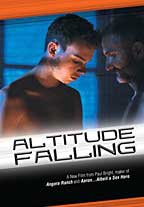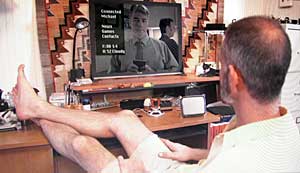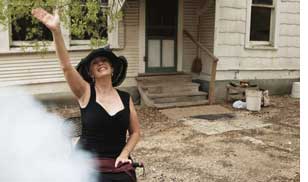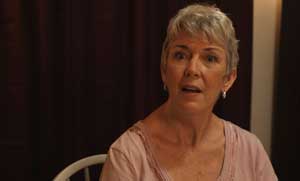|

Altitude
Falling
Waterbearer
Films,
2010
Director/Screenplay:
Paul Bright
Starring:
William Diamond,
Paul Bright,
Cynthia Schiebel,
Brenda Kuciemba
David Laduca,
Jack the Garden Cat
Unrated,
93 minutes
|
Generations
by
Michael D. Klemm
Posted online, July 2010

Altitude
Falling
(2010), the newest film from writer/director Paul
Bright, boasts an intriguing premise. The year is 2029 and the setting
is Chama, a rural New Mexico town. Privacy is a thing of the past because
the nation's citizens have been implanted with identification chips. Though
originally intended for medical emergencies, these chips became the means
to track everyone's purchases, politics and whereabouts after the government
stepped in. So much for freedom. Greg Forrester (Bright) is one of the
scientists behind this abused tech miracle and he's moved away to a small
town to distance himself from the monster he created. There's no escaping
the scanners in every building that read people's chips as they walk by,
but the rural surroundings offer some respite. The only other
alternative is going completely off-grid by cutting out your chip and
becoming a "Nopaper." (The government views such individuals as dangerous
and thinks there is a militant group of them living in the hills outside
of Chama.)
|
|
 The
middle-aged Greg keeps mostly to himself until he meets and falls in love
with Danny (William Diamond), a young man barely in his twenties. Danny
and his mother have just moved to town to stay with her mother until they
can find work. It turns out that Greg and the two women have a shared
past. Mother (Brenda Kuciemba) was once married to Greg's lab partner,
and she is furious with both men for selling out humanity with their invasive
invention. Her mother, Isadora (Cynthia Schiebel),
is a retired actress whose career was over after Greg recorded her speech
for the software and she became the voice for every scanner on the planet.
Greg is still in touch with Danny's estranged father and he uses his prior
connections to help get the lad a job with a Peace Corps-style organization.
Before Danny learns about his new friend's background, he and Greg become
spring/autumn lovers, something we rarely see in male queer cinema. The
middle-aged Greg keeps mostly to himself until he meets and falls in love
with Danny (William Diamond), a young man barely in his twenties. Danny
and his mother have just moved to town to stay with her mother until they
can find work. It turns out that Greg and the two women have a shared
past. Mother (Brenda Kuciemba) was once married to Greg's lab partner,
and she is furious with both men for selling out humanity with their invasive
invention. Her mother, Isadora (Cynthia Schiebel),
is a retired actress whose career was over after Greg recorded her speech
for the software and she became the voice for every scanner on the planet.
Greg is still in touch with Danny's estranged father and he uses his prior
connections to help get the lad a job with a Peace Corps-style organization.
Before Danny learns about his new friend's background, he and Greg become
spring/autumn lovers, something we rarely see in male queer cinema.
Third
act drama explodes when the four leads meet for dinner. But that's nothing
compared to the news that Danny and his fellow workers are going to be
conscripted into a covert army maneuver, under the pretense of disaster
relief efforts, and dropped into a war zone. Can Greg rescue him somehow
before it's too late?
|
|
 The
mission statement on the homepage for Paul Bright's Silly
Bunny Pictures announces that they specialize in stories about gay
men living in the heartland and that they "make movies for fun." This
is a good thing. Hollywood studios, on the other hand, are mostly interested
in making obscene amounts of money. Independent filmmakers like Bright
are crafting personal movies as an alternative to the soul-less blockbuster
and I respect them for that. His earlier films, Theft
and Aaron...Albeit A Sex Hero were so
infectiously goofy that you overlooked how low budget they were. The
mission statement on the homepage for Paul Bright's Silly
Bunny Pictures announces that they specialize in stories about gay
men living in the heartland and that they "make movies for fun." This
is a good thing. Hollywood studios, on the other hand, are mostly interested
in making obscene amounts of money. Independent filmmakers like Bright
are crafting personal movies as an alternative to the soul-less blockbuster
and I respect them for that. His earlier films, Theft
and Aaron...Albeit A Sex Hero were so
infectiously goofy that you overlooked how low budget they were.
|
|
 But
Bright has set the bar a little higher for himself on Altitude
Falling and the results are mixed. I'm not saying that
the film's science fiction concept requires a mega-budget - the lack of
CGI and flashy high-tech props actually works in the movie's favor. But
because this film is more ambitious and serious than its predecessors,
its flaws are magnified. The script could have used some polishing. Some
of the dialogue is clunky, making the acting a bit stiff and forced. Sometimes
more than a bit. As a director, Bright excels at making movies
out of what are obviously very limited resources but he might be wearing
too many hats on this one. According to the "making of" doc, the film's
shoot was only eight days; it might have been a good idea to stay behind
the camera and direct another actor in the lead role. The ending is dramatic
but needed to be more visceral. The romance is sweet but never catches
fire. But
Bright has set the bar a little higher for himself on Altitude
Falling and the results are mixed. I'm not saying that
the film's science fiction concept requires a mega-budget - the lack of
CGI and flashy high-tech props actually works in the movie's favor. But
because this film is more ambitious and serious than its predecessors,
its flaws are magnified. The script could have used some polishing. Some
of the dialogue is clunky, making the acting a bit stiff and forced. Sometimes
more than a bit. As a director, Bright excels at making movies
out of what are obviously very limited resources but he might be wearing
too many hats on this one. According to the "making of" doc, the film's
shoot was only eight days; it might have been a good idea to stay behind
the camera and direct another actor in the lead role. The ending is dramatic
but needed to be more visceral. The romance is sweet but never catches
fire.
|
|
 However,
what it lacks in studio gloss and polish, it gains in ideas. Not to mention
honesty. Flaws aside, the lack of pretension in Bright's films has always
been refreshing and this one is no different. It grows on you as the story
develops. Some of the best moments come when just the images do the talking.
The close-ups of hands when Greg and Danny make bread together recalls
the clay-throwing-as-foreplay scene in Ghost. A swimming hole scene,
while not quite a painting by Thomas Eakins, is nevertheless suitably
playful and idyllic. Photography of country scenery is utilized without
overkill. Minimalist piano by classical composer Erie Satie mixes with
the quiet sounds of nature. However,
what it lacks in studio gloss and polish, it gains in ideas. Not to mention
honesty. Flaws aside, the lack of pretension in Bright's films has always
been refreshing and this one is no different. It grows on you as the story
develops. Some of the best moments come when just the images do the talking.
The close-ups of hands when Greg and Danny make bread together recalls
the clay-throwing-as-foreplay scene in Ghost. A swimming hole scene,
while not quite a painting by Thomas Eakins, is nevertheless suitably
playful and idyllic. Photography of country scenery is utilized without
overkill. Minimalist piano by classical composer Erie Satie mixes with
the quiet sounds of nature.
|
|
 Gay
science fiction films are a rarity. The same can be said for sci-fi films
that aren't driven by pure spectacle. Over the years, Hollywood has never
learned that speculative fiction is really about ideas and not just ray
guns in space. The concept of implanted scanners and government surveillance
isn't a new one. The ins and outs of this future society could have been
fleshed out more but we know enough to get by. What is here, despite
the sci-fi trappings, are two ordinary gay men who live in the heartland
- fulfilling the filmmakers' mission statement. Gay rights no longer seems
to be an issue, but our lovers are still fighting the good fight when
they rebel against an unjust government. Gay
science fiction films are a rarity. The same can be said for sci-fi films
that aren't driven by pure spectacle. Over the years, Hollywood has never
learned that speculative fiction is really about ideas and not just ray
guns in space. The concept of implanted scanners and government surveillance
isn't a new one. The ins and outs of this future society could have been
fleshed out more but we know enough to get by. What is here, despite
the sci-fi trappings, are two ordinary gay men who live in the heartland
- fulfilling the filmmakers' mission statement. Gay rights no longer seems
to be an issue, but our lovers are still fighting the good fight when
they rebel against an unjust government.
|
|
 I
like that the gay aspect to their relationship seems incidental to the
main plot. Danny's mother isn't the least concerned that her son is seeing
a man (let alone an older man), she's just angry because he's seeing Greg!
Danny's father asks jokingly, while speaking over a video computer link-up,
if Greg is asking for permission to date his son. There is also an early
scene in which a muscular young drifter turns out to be a "nopapers" and
he thinks nothing of offering sexual favors to Greg in exchange for his
help. I
like that the gay aspect to their relationship seems incidental to the
main plot. Danny's mother isn't the least concerned that her son is seeing
a man (let alone an older man), she's just angry because he's seeing Greg!
Danny's father asks jokingly, while speaking over a video computer link-up,
if Greg is asking for permission to date his son. There is also an early
scene in which a muscular young drifter turns out to be a "nopapers" and
he thinks nothing of offering sexual favors to Greg in exchange for his
help.
|
|
 Okay,
the film isn't going to win any awards at Cannes, but it will better engage
your mind than some big budget, over-hyped tripe like Independence
Day or 2012 where everything blew up real good. I'll take an
indie director's personal vision any day over a film made by commitee
and focus groups. With an ending decided by teenaged preview audiences.
This one certainly thinks outside the box. Okay,
the film isn't going to win any awards at Cannes, but it will better engage
your mind than some big budget, over-hyped tripe like Independence
Day or 2012 where everything blew up real good. I'll take an
indie director's personal vision any day over a film made by commitee
and focus groups. With an ending decided by teenaged preview audiences.
This one certainly thinks outside the box.
More
On Paul Bright:
Theft
Aaron...Albeit A Sex Hero
Abrupt Decision
Goliad Uprising
Cynthia
Schiebel also appears in:
Theft
Aaron...Albeit A Sex Hero
Abrupt Decision
Goliad Uprising
David
Laduca also appears in:
Theft
Abrupt Decision
|

